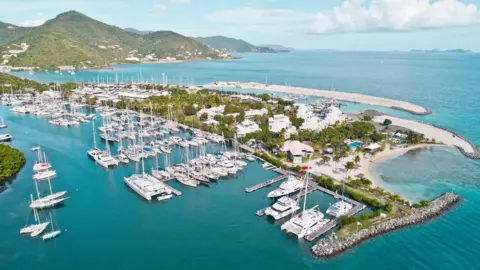British Virgin Islands: UK minister dispatched for governance talks
 Getty Images
Getty ImagesThe UK government has sent a minister to the British Virgin Islands after an inquiry called for a return of UK rule.
In a turbulent week for the overseas territory, its leader Andrew Fahie was arrested in the US for alleged drug trafficking and money laundering.
After his arrest, a report led by a British judge was released recommending direct rule be imposed from London due to corruption concerns.
But the acting leader of the BVI has said he opposes the UK taking control.
The BVI is a British overseas territory home to more than 35,000 people and made up of more than 40 islands, located in the Caribbean to the east of Puerto Rico.
It operates as a parliamentary democracy, with the premier acting as the head of the elected government alongside the governor, who is appointed by the UK government and represents the Queen.
Foreign Secretary Liz Truss said Amanda Milling, the minister for overseas territories, was travelling to the territory for talks with BVI governor John Rankin and other senior figures on Saturday.
She said the UK government would outline the next steps for the island's governance following the discussions.
Mr Rankin, who it is recommended should take over the rule of the territory, has said his main concern would be the best interests of the BVI's population.
However, acting premier Natalio Wheatley has said the territory opposes efforts by London to impose direct rule.
"What this would mean in real terms is that there would be no more elected representatives who represent the people of the districts and the territory in the House of Assembly where laws are made for our society," he said.
"There also would be no government ministers to advance the public's priorities or a cabinet to approve policy. All of this authority would be vested in the governor."
He told BBC Radio 4's The World Tonight the BVI could address governance problems without resorting to UK direct rule - and said he did not believe the BVI's people wanted to see the constitution suspended.
"Every country in the world has challenges with governance, including the UK," he said.
Mr Wheatley said he had had productive talks with Ms Milling and was expecting those to continue when she arrived in the territory on Saturday, although he said some conversations might be "uncomfortable".
 Government of the Virgin Islands
Government of the Virgin IslandsThe crisis facing the islands was brought to a head on Thursday when it emerged Mr Fahie had been arrested by the US Drug Enforcement Agency in Miami.
He was detained alongside the head of the BVI's ports Oleanvine Maynard, whose son was also arrested in connection with the case.
They have been charged with cocaine trafficking and money-laundering conspiracies after appearing by video link at a Florida court on Friday, US prosecutors confirmed. They will remain in custody until a bond hearing on Wednesday.
Mr Fahie is accused of agreeing a $700,000 (£560,000) payment to allow traffickers to use BVI ports with an undercover informant, charges filed in the US said.
Questions about governance in the territory pre-dated the arrests, with long-standing concerns over state corruption and misuse of taxpayers' money, but the news expedited the release of an inquiry about how best to address them.
The report, commissioned in 2021 and led by British judge Sir Gary Hickinbottom, described the state of governance in the BVI as "appallingly bad", but is not directly connected to the arrest of the premier.
It recommended the UK government suspend the overseas territory's constitution and implement home rule for at least two years, meaning the islands would effectively be returned to direct rule from London.

Clouds over Paradise
Nomia Iqbal, BBC News, the British Virgin Islands
The weather was stormy and grey as our team landed in the British Virgin Islands - perhaps reflecting the crisis that's engulfed them.
Some airport staff told us they weren't entirely shocked by the claims being made against Andrew Fahie - and they are worried about what happens next.
Staff in a downtown salon in Road Town say they've been following the story but don't know what to believe. One waitress at a nearby restaurant tells us she lives near Mr Fahie and is shocked by the scale of the allegations. However, she says corruption is "not just here but in other countries".
When we ask if the British governor taking control would be a solution, she shakes her head. "People here won't like that. They want to be left to run things themselves."
More than 35,000 people live on the islands with aspirations of self-determination and achieving modern democracy. Ministers here are due to meet with their UK counterparts next week. They say they will strongly oppose any attempt by London to impose direct rule.

After instructing Ms Milling to travel to the BVI, Ms Truss described the arrests as "extremely concerning" and argued they demonstrated the need for "urgent action".
She said the inquiry showed "clearly that substantial legislative and constitutional change is required to restore the standards of governance".
Ms Truss added that overseas territories formed a "core part of the UK family" and the government was "committed to the security and wellbeing of the people of the British Virgin Islands".
In a televised statement on Friday, governor Mr Rankin pledged that his overriding concern would be the best interests of the people of the BVI - "ensuring transparent, honest and open governance".
Leaks of documents known as the Panama Papers and Paradise Papers previously revealed the islands to be a popular tax haven.
British overseas territories are regions which have retained a constitutional and historical link to the UK - these include Gibraltar and the Falkland Islands.
Most are largely self-autonomous with their own governments but the UK retains responsibility for their defence and foreign relations.
